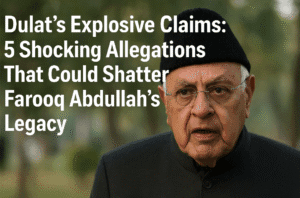Dulat’s Explosive Claims: 5 Shocking Allegations That Could Shatter Farooq Abdullah’s Legacy
A political storm has erupted in Jammu and Kashmir following claims by former RAW chief AS Dulat in his forthcoming book, The Chief Minister and The Spy, alleging that National Conference leader Farooq Abdullah privately supported the 2019 revocation of Article 370. Abdullah, a key architect of the cross-party Gupkar Alliance advocating the provision’s restoration, dismissed the claims as “cheap stunts,” citing his seven-month detention post-abrogation as proof of his opposition.
Dulat’s assertion that Abdullah remarked, “We would have helped” contradicts the latter’s public stance, sparking accusations of opportunism from rivals like PDP’s Iltija Mufti and Sajjad Lone of the People’s Conference. Critics highlight inconsistencies, including the dissolved J&K assembly in 2018, which Abdullah stressed made Dulat’s claims implausible. The controversy, timed ahead of the book’s release and potential elections, risks undermining the fragile Gupkar Alliance and reignites debates about backroom politics, trust in leadership, and Kashmir’s unresolved constitutional crisis.

Dulat’s Explosive Claims: 5 Shocking Allegations That Could Shatter Farooq Abdullah’s Legacy
The contentious scrapping of Article 370 in 2019, which stripped Jammu and Kashmir (J&K) of its special status, remains a lightning rod in Indian politics. A fresh controversy has erupted with former RAW chief AS Dulat’s upcoming memoir, The Chief Minister and The Spy, alleging that National Conference (NC) patriarch Farooq Abdullah privately backed the move—a claim Abdullah vehemently denies, calling it a “cheap stunt” to sell books.
The Core of the Controversy
Dulat’s book, set for release on April 18, asserts that Abdullah, despite publicly opposing Article 370’s revocation, privately confided, “We would have helped. Why were we not taken into confidence?” The timing of this revelation—days before the book’s launch—has raised eyebrows, with critics questioning its motives.
Abdullah, an 84-year-old veteran politician and three-time Chief Minister of J&K, was detained for seven months post-2019 alongside his son Omar, the current CM. Both spearheaded the Gupkar Alliance, a coalition of regional parties demanding Article 370’s restoration and statehood for J&K. Dulat’s claims, if true, would undermine Abdullah’s credibility as the alliance’s figurehead.
Abdullah’s Fiery Rebuttal
Abdullah dismissed the allegations as “figments of imagination,” emphasizing his unwavering opposition to the abrogation. “We were detained because our stance was clear,” he stated, referencing his detention and the Alliance’s formation. He also countered Dulat’s suggestion of influence, declaring, “I am no one’s puppet.”
Critically, Abdullah highlighted a factual inconsistency: J&K’s legislative assembly was dissolved in 2018, making Dulat’s claim of a potential resolution supporting Article 370’s removal implausible. “Had the assembly been active, I’d never consider such a resolution,” he asserted.
Political Reactions: Allies and Adversaries Weigh In
The claims have polarized Kashmir’s political landscape:
- Sajjad Lone (People’s Conference): Called Dulat “Abdullah’s alter ego,” lending credibility to the claims while mocking Delhi’s “Uncles and Aunties brigade.”
- Iltija Mufti (PDP): Accused Abdullah of complicity, citing his 2019 meeting with PM Modi days before the abrogation.
These reactions underscore the fragile trust within the Gupkar Alliance, particularly between NC and PDP, historic rivals now united by circumstance.
Dulat-Abdullah Dynamics: A Complicated History
Dulat, a former spymaster, has long been associated with backchannel diplomacy in Kashmir. His proximity to Abdullah—detailed in his 2015 memoir Kashmir: The Vajpayee Years—adds intrigue. Critics argue Dulat’s narratives often blend fact with strategic ambiguity, reflecting his intelligence background.
Broader Implications
- Credibility of the Gupkar Alliance: Dulat’s claims risk fracturing the coalition, which hinges on collective opposition to Article 370’s revocation.
- Public Perception: For Abdullah’s supporters, the allegations threaten to erode trust in his leadership, especially amid ongoing struggles for statehood.
- Timing and Intent: With J&K’s elections looming, the book’s release could be a calculated move to destabilize the Alliance or divert discourse from pressing issues like unemployment and security.
Unanswered Questions
- What transpired in Abdullah’s 2019 meeting with PM Modi?
- Why did Dulat wait six years to reveal these claims?
- How will this impact the NC’s grassroots support, particularly in Kashmir’s volatile political climate?
Conclusion: A Battle of Narratives
The Dulat-Abdullah saga underscores the murky intersection of intelligence, politics, and media in Kashmir. While Dulat’s revelations may boost book sales, they also risk deepening public cynicism toward political elites. For now, Abdullah’s legacy hangs in the balance, as the people of J&K navigate a landscape where truth often becomes collateral in larger ideological wars.
As the debate rages, one reality remains unchanged: the quest for justice and autonomy in Kashmir continues to be shaped by whispers, alliances, and the shadows of history.
You must be logged in to post a comment.